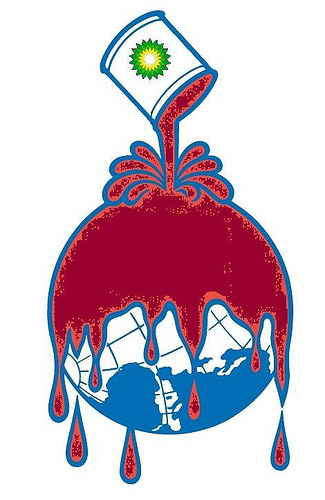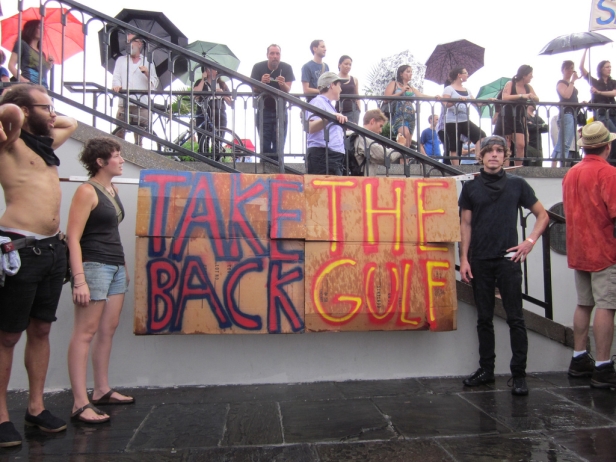Send your question to Umbra!
Q. Dear Umbra,
I always love reading Umbra’s Q&A’s. But right now with the oil spill taking over the Gulf and ruining so many ecosystems, I just don’t know if anything I do really makes a difference.
I live in southern Louisiana and remember feeling the same way after Katrina. It seemed so ridiculous to worry about using paper towels or using plastic bags (I don’t use either by the way), etc. when the streets were piled high with so much garbage — T.V. sets, refrigerators, piles and piles of plastic bags, plastic chairs, plastic everything! I feel the same helplessness now — but much worse in many ways. Why even bother? What can the little things I do matter when compared to one big horrible thing like this? I hope you disagree with me and tell me why I should care.
Kayakpatty
 Mike Licht, NotionsCapital.com
Mike Licht, NotionsCapital.com
A. Dearest Patty,
You are not alone. A lot of us are feeling depressed and disheartened by what is happening right now in the Gulf. It is terrible beyond words. It’s so bad I don’t even like using the word beyond anymore.
Being overwhelmed by a big crisis may cause us to think that our personal actions are meaningless. But this is where we’re wrong, dear Patty.
Just this week New York Magazine noted that, “recent neuroscience and behavioral-economics research suggest that changing people’s individual behavior may be the best way to grow a movement.”
Furthermore, an analysis from the Garrison Institute’s Climate Mind Behavior Project (CMB) and the Natural Resources Defense Council, found that “Americans can reduce U.S. carbon pollution by 15 percent — or one billion tons of global warming pollution — through collective personal actions that require little to no cost.”
So go ahead and sweat the small stuff! The “little things” we all do are not futile. In fact, little things add up fast. Especially if you do them, and then talk to your friends and family so that they start doing them too. That’s the magic of the multiplier effect.
Grist put it best: “Practiced consistently, small steps facilitate both gradual evolution and rapid revolution for positive lasting change. Of course institutional and policy change is crucial, but it doesn’t happen on its own; it happens when people fight for it, motivated by their values.”
If, after all that, you still feel like what you do is meaningless, Patty, it’s time to consider that you might be depressed. It’s been said that depression is anger turned inward. If that’s true, here’s the best anti-depressant: channel your anger into action and conversation.
In his book, The Tipping Point, Malcolm Gladwell talks about how change often happens quickly, like an epidemic. Right now, we’re at “The Spilling Point.” All this coverage of the Gulf oil disaster is making more people more open to more sustainable solutions. We need to take advantage of this moment. Remember how the H1N1 scare got people wearing facemasks in public places? Well, the Gulf oil leak can create a transformative viral effect if we take action.
So not only should you keep doing what you’ve been doing, dear Patty, you should step it up a notch. Be infectious!
Here’s how:
Talk to all of your friends, family, co-workers, Facebook pals, Twitter followers, that weird lady on the bus, etc. about consumption, not only of fossil fuels, but of what we eat, buy, turn on, wear, use, or throw out. Get them to ask themselves: “Is this thing I’m consuming necessary?”
If the answer is no, here are 11 simple steps they can all take. These actions don’t cost much, if anything, and they may make you and your circle happier and healthier while you’re helping the planet. Of course, there’s always more we can do. But the list is a good conversation piece and starting point. Pass it along. May it reach everyone, even the people who eat Styrofoam.
(There’s a lot more information online.)
Easy things anyone can do to fight oil spill anger/apathy (in random order):
- Take one less airline flight per year
- Keep your car tires properly inflated, engine tuned and take 100 excess lbs. out of your car
- Leave your car at home one day a week (use mass transit, bike, or innovative ride-sharing programs like Weeels)
- Carpool two days a week or telecommute one day a week
- Go meatless on Monday’s and switch from red meat to poultry two days a week
- Support your local Farmer’s Market or Community Supported Agriculture (CSA)
- Use recycled paper products (office paper, toilet paper, paper towels)
- Reduce the number of catalogues you receive by more than half
- Turn off unused lights, use the hibernate mode on your computer, unplug things when you’re not using them
- Wash your clothes in cold water 75 percent of the time and hang clothes out to dry in summer
- Share more – including this list, and talk to people in your life — at work, weddings, in elevators or better yet on the stairs — about other simple ideas to add to the list
Gandhi said, “You must be the change you wish to see in the world.” Be the change, Patty! And get out there and spread the word, like Paul Revere on his midnight ride.
Giddyup,
Umbra
P.S. Dearest readers, how have you been coping with the oil spill? Has it given you new opportunities to talk to people about consumption, or motivated you to do things differently in your own life? Will you share the list above with others? And what would you like to add to the list? Let me know.
P.P.S. Inspiration for the road:
We can do no great things, only small things with great love. -Mother Teresa
Do not doubt that a small group of thoughtful, committed citizens can change the world. Indeed it is the only thing that ever has. – Margaret Meade
Unless someone like you cares a whole awful lot, nothing is going to get better. It’s not. -Dr. Seuss


